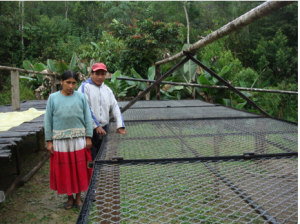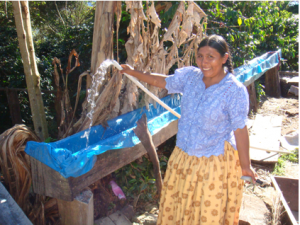 Want to learn more about our featured Bolivian coffee, sourced through our partnership with Cafe Femenino? We’ve obtained some stories behind these special coffee beans from the great people behind Cafe Femenino, Connie Kolosvary and Dustin Johnson:
Want to learn more about our featured Bolivian coffee, sourced through our partnership with Cafe Femenino? We’ve obtained some stories behind these special coffee beans from the great people behind Cafe Femenino, Connie Kolosvary and Dustin Johnson:
Supporting Fair Trade Organic Coffee in Bolivia
In the mountains of the Caranavi region in Bolivia, Bolivian Cafe Femenino grows. Since 2008 the women’s group has been meeting and working hard to find solutions to the problems their families face. With few economic resources to improve their lives, the women’s group decided to focus on coffee quality and improving the processing of the picked cherry in order to increase yields. Also, as more women took charge of their coffee production, they realized the need to consistently produce the highest quality of their coffee in order to be able to call it Cafe Femenino.
In 2010 the group developed a plan to expand the amount of drying tables they had access to. In Caranavi like most high elevation production areas, heavy rains during the wet season create challenges for the drying process. The Café Femenino producers decided with drying tables available to them they could properly dry the coffee in a manner that would better maintain the quality.
With support from the Cafe Femenino Foundation and from the farmer’s cooperative they were able to construct enough drying tables to benefit 80 women. Additionally, the project funds provided trainings for the women in the areas of farm management and coffee improvement. Several women and their families have now benefited from this much needed investment.
By ensuring that less of the coffee crop is lost due to moisture these Café Femenino producers have higher yields and thus receive a higher income for their coffee.
The Café Femenino Foundation continues to support women coffee farmers and their families through trainings and projects that are organized and requested by the women themselves. Your purchase of Fair Trade and Certified Organic Café Femenino Coffee supports these projects in Bolivia and around the world.

Andrea’s Story
Andrea Hilari Condori is a tough woman who holds her own. She has an infectious, youthful energy about her that spreads from her genuine smile to those around her. She laughs when I ask her if she has ever had a husband. “They have all got away from me,” Andrea chuckles. She is a single woman without children, but has 6 siblings, one of which has a coffee farm next to hers. Common to the style of the indigenous Aymara women in Bolivia, Andrea wears a colorful blouse and ankle-length skirt accompanied by shiny, jet black hair, woven into two long braids. She has dedicated her life to being a successful coffee farmer, an active community leader, a cooperative member, and now a Café Femenino producer and leader.
Her small, 3-acre lot is an immaculate farm, filled with lush coffee trees and mixed with mandarins, lemons, oranges, plantains, and bananas. Andrea is excited to show us around. We march down the hill through her property on soft rich soil she fertilizes with organic compost. She is spouting off names of the plants and trees, and pointing to this and that. We are surrounded by row after row of coffee trees, covered thick with red and yellow cherries. We snack on the oranges and mandarins that she snatches up, handing us several at a time.
The beans surrounding us that her and her fellow community members produce are only of the highest quality. They have to be! No matter how much Andrea nurtures her product, many obstacles await these beans. Bolivian coffee faces geographic challenges unlike any other. It is a landlocked country between the Eastern Amazon of Brazil, the Peruvian Andes, and the northern desert of Chile. The country is divided by the immense mountains that rise and fall sharply, creating difficult terrain, roads, accessibility, and communication.
Andrea’s farm is located just 2 hours from Caranavi, a small city at the eastern base of Bolivia’s Andes Mountains. From Caranavi, the coffee still must travel 6 hours up and over steep roads and snow-covered peaks, then drops down into a shared factory to be de-hulled and sorted. This trip boasts a change in elevation of more than 12,000 feet, from which the coffee can lose humidity or be frozen, among other delays. After milling, the journey continues down the western side of the Andes, across the Bolivian border into the northern desert of Chile, and on to the Port of Arica before being shipped to a warehouse. It is this kind of mileage that requires every bean to be picked, processed, and cared for with the utmost precision and experienced planning, in order to be ready to roast and enjoy.
Back on Andrea’s farm, we complete the loop back to her house. On the front patio, she shows us where she manually de-pulps the coffee, leaves it to ferment for 8-12 hours, washes it, and then transfers it on to raised drying beds. If the coffee stays wet too long it will continue to ferment, and one bean could turn an entire batch sour. After she explains her routine to us, she grabs a plastic water pipe that is gravity fed from the hillside stream, pulls out the plug, and comments on the water’s purity as it gushes from the tube. She laughs, “Agua Femenino!” Her smile stretches ear to ear with pride at her pristine farm. I think about my earlier question and come to my own conclusion. Andrea is not single because the men got away; – it’s because none of them could ever keep up.
Andrea is just one of thousands of reasons Organic Products Trading company continues to provide high-quality Fair Trade, Organic coffee. She and her fellow Café Femenino producers have hit the ground running to establish the project in Bolivia and sell higher quality coffee than their neighbors and spouses. Your purchase of Café Femenino Coffee will help support women like Andrea in Bolivia and other participating countries in Central and South America, Africa, and the Caribbean.

